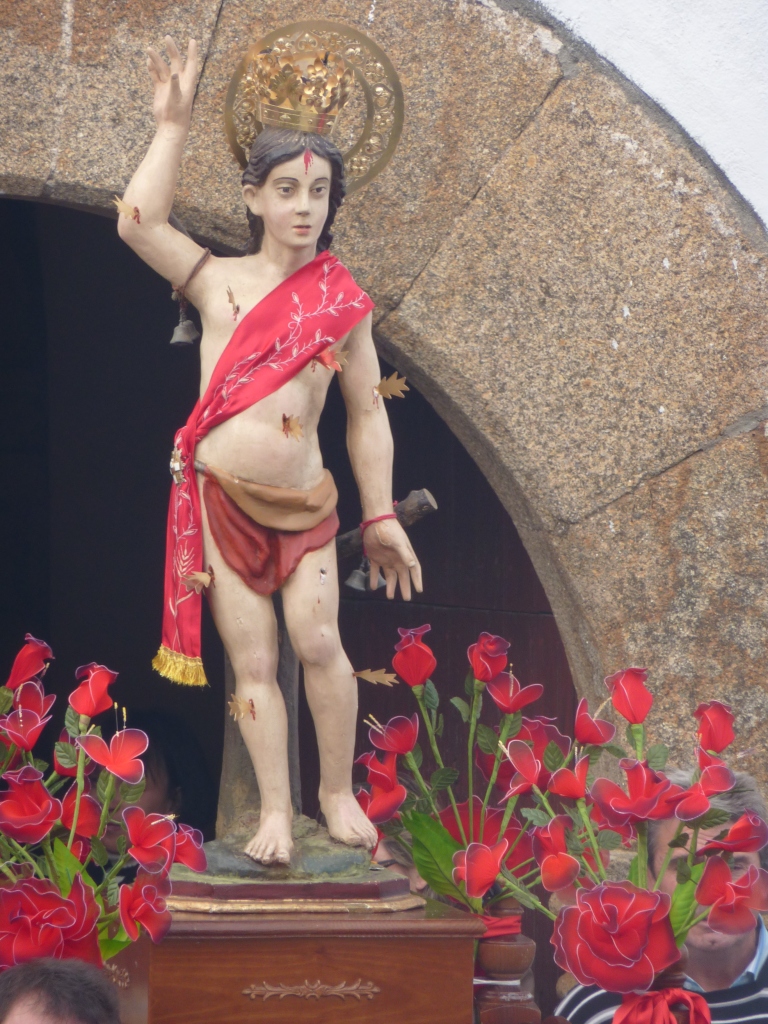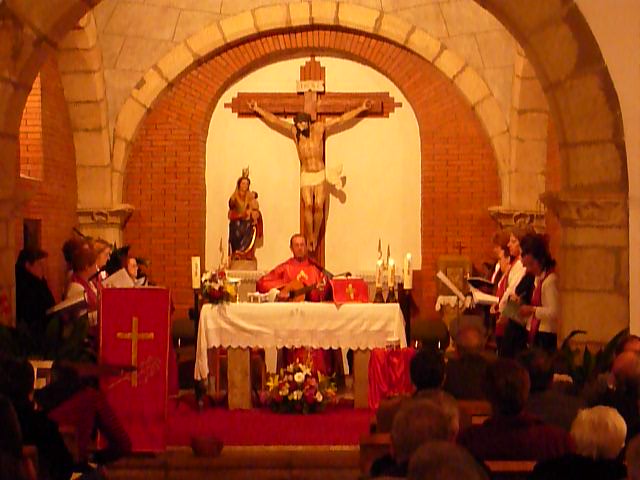Christopher Shepherd-Smith SJ 1943 – 1977
An account originally published in an older and lost version of the Raft-of-Corks Blog.
Posted on January 19, 2012 by John Fletcher
There were many tales about Shepherd-Smith. It is said that “Sheppy” reacted swiftly when the minibús in which he was travelling with some fellow Jesuits had a puncture on the M6. Before calling the emergency service or attempting to change the wheel, he invited his friends to kneel down with him on the hard shoulder and say the rosary. This man, for me, is the rudder of the raft of corks.
I didn´t know Sheppy well yet he has become present to me recently. We lived together in the early 70´s for a short time in Southwell House, a Jesuit community in London. The community was a wonderful mixture of older Jesuits, the Way community, university teachers and students. These years were the years when the champagne corks were popping out of bottles stored since before the Council of Trent, made loose by the fermentation triggered by the second Vatican Council: they were years in which Western Society was bathed in the warm waters of growing affluence rising on huge surges of creativity and freedom. As individuals we were like corks liberated from the bottleneck in an explosion, joyously floating into the sky and coming to land in a huge ocean where the horizons of possibilities, of personal choices and separate realities seemed infinite. In this huge sea we were separated from each other.
If my metaphors are mixed then it is because I lived these years in plenty of inner conflict. I certainly didn´t know how to navigate in this ocean and, in the currents of the time, I happily swept all the rules aside. One day Christopher Shepherd-Smith left a book on the table in my study bedroom. I didn´t know him and didn´t know from whom the book had come. It was an old book, a text for spiritual reading. I was puzzled. How on earth would anyone think I could take such a book seriously? The title was something like “The Wiles of Satan.” It is true that my life might have been interpreted as a bit decadent if you were to take into account my drinking, womanizing and laughter, my partisan passion for football as well as my lack of interest in religious ritual and order in general.
Occasionally I would attend community Mass and it was at one of these that I had my only real contact with Shepherd-Smith. The Eucharist was fairly informal and we were all invited to share our own personal desires in the form of prayers of petition. Christopher Shepherd-Smith prayed that he might die as a martyr, if that was God´s will for him. I had heard the story about the puncture on the motorway and had laughed. This had me chortling away silently. I was not, I think, laughing at Sheppy but at the absurdity, the anachronism that in this era anyone could pray for martyrdom. This was the age of tolerance not persecution. We had ended the war in Vietnam with our protests.
After Mass, Sheppy spoke to me the only words he ever addressed to me. “John, I left a book for you in your room. I think you might find it helpful.” I didn´t ever read the book but I was thoroughly amused.
Two years ago today I was on a walk to a local village where they were celebrating the feast of their patron San Sebastian, or Saint Spike as my children used to call him because of all the arrows sticking out of him. It was a warm January day and as I strode at a rhythmic pace Sheppy was, I sensed, beside me. Where has he come from? He had not crossed my mind for years and here he was present to me. It was not a physical presence. Nor was it that I was simply remembering him. He was there alongside me and I felt much warmth, even gratitude for his being there. I laughed again as I said to him, “Did you really get everyone to kneel down and pray on the motorway?” And I laughed at his leaving me the book on the Devil. Then it dawned on me that his being there was no coincidence at all.
San Sebastian
For the previous 18 months I had been slowly, every day, spending time on the Spiritual Exercises of Ignatius of Loyola. I spent some time on the final contemplation and have been experiencing what Ignatius calls “consolation”. Overall, the exercises help people to find a direction in their lives. The concept of sin, for St Paul, was that of being off target, going in the wrong direction: like the arrow which leaves the bow of an archer who cannot focus on his target. As I walked to the village of Hernan Perez I could hear the rockets and see the smoke of the celebrations of San Sebastian who had been martyred by arrows. I was thinking about the errors in my life, arrows going in all directions, deflected by the wind or even blown back on course.
Ignatius lived at the beginning of the 16th C so his universe comes to us in his own terms of that time. I used to think that all the old language of religion needed to be translated into modern terms. Now I see it is perfectly good because it aims to express truth and truth cannot be expressed fully in any language. When someone speaks the truth it is nothing more than an invitation to enter into an experience. Inside that experience every language is valid and enlightening. Translation is unnecessary. Good metaphors do the job and speak for themselves.
One of the central insights offered by The Exercises of Ignatius is contained in his notes on the discernment of Spirits. There is a most down to earth description of this in Margaret Silf´s “Inner Compass” or (“Landmarks” in the UK : they are the same text!)
Ignatius speaks of the movements we can notice within ourselves if we pay attention to our reactions. Here is an excerpt from an Australian web site: “God does not speak to us by an audible voice (except, perhaps, in rare circumstances). His normal way of communicating is by more subtle leadings and promptings. He may speak through circumstances, or by an ‘inner voice’ by which we know he has communicated with us, but we have not heard words. His communication may seem like a thought to us or an idea or a realisation. Yet his communications have a different quality, and as we grow in the ability to discern, we come to recognise ‘his voice’ more frequently.”
Today, I begin to see the tricks, or self-deceptions: the movements within me that divert me from the challenge to be just who I am and unbalance me. In very traditional terms, I am aware of the wiles of the devil. For the fact is that nobody can disturb our deep inner peace.
Yet sometimes I feel very disturbed, hurt, restless, doubtful or one of many uncomfortable and stormy states far from a tranquil shore. It is the wile of the devil but the commentators on The Exercises today avoid such terms. When all is going well something happens which brings down a fog. If we keep travelling in the fog we lose sense of place and time. We no longer have our landmarks, our security. It is often very tempting to keep going and to guess where we are. In the end we may emerge but at a cost, often at a very great cost. But if we stop, just stay still, we can be sure that the fog will lift. In my case I sometimes become disorientated but want to keep going. I may find an object, a person, to blame. Or I begin to take decisive action. All I actually need to do is acknowledge my feeling and wait. No one else is responsible for the reactions I produce and if I can stay still with myself I know the squall will pass.
I imagine Sheppy at the moment he was shot dead in Zimbabwe. For his prayer was answered a couple of years after he gave me the book when he was taken out of his mission house and killed by rebels, along with a Jesuit Brother, John Joseph Conway and Father Martin Thomas. Undoubtedly he would not have blamed the gunmen for his death.
So, as I continued my walk to Hernan Perez in this beautiful Sierra de Gata, I mused on the martyrdom of Christopher Shepherd-Smith, amused in wonder at the constellations which seem to make sense without reason of incomprehensible confluences in life and could believe that Sheppy was with me.
100% for God, no less.
I was aware of his single-minded purpose in life in which absolutely everything was focused. In the Exercises and every day he would undoubtedly have said this prayer Ignatius gave us:
Take, Lord and Receive
Take, Lord, and receive all my liberty,
my memory, my understanding, and my entire will.
All I have and call my own.
Whatever I have or hold, you have given to me.
I restore it all to you and surrender it wholly
to be governed under your will.
Give me only your love and grace
and I am rich enough and ask for nothing more.
Saint Sebastian, too, was radical enough to take this prayer seriously and I do not doubt that these men met their deaths giving thanks for their lives and knowing it was their destiny.
The notion of the Raft of Corks came to me one wet night at a meeting in Seés, in Normandy. Over 200 people turned up from the small scattered communities around this Cathedral town with a village-sized population. They had come to hear a priest talk about the Catholic Church. I was quite astonished at the turn out. I cannot recall what he said but I remember thinking that all of us there were like corks in the ocean, discarded from the Catholic Church, and carried along by our own currents and tides. Somehow we had come together that night and formed a unit, a raft. Those of us who drifted away from our traditional spiritual roots in the 70´s, 80´s and 90´s had not entirely lost our bottle. Some day we would find the others. This blog is about that story.
So I reached my destination of Hernan Perez, a small village in the north of Extremadura, where they grow olives and peppers. Next Saturday 30th January, 2010, they are sacrificing a large pig and cooking it for all comers to share. This is the common feast at the end of their annual fiesta in honour of San Sebastian.
One week later is the anniversary of the death of Sheppy who is the patron Saint of this blog.
Father Christopher Shepherd-Smith (1943-1977)
killed 6 Feb 1977


